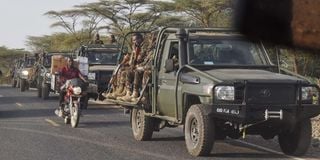Premium
Liberating the North: Why we must rid Kenya of banditry and the cattle rustling menace

Kenya Defence Forces (KDF) vehicles ferrying soldiers in a convoy at Marigat in Baringo County on February 17, 2023.
More than 60 per cent of Kenya’s land mass lies in areas that are considered unsafe and insecure for any meaningful economic activities. Most of these areas are situated in the northern parts of the country, as well as parts of the expansive Rift Valley region.
What this means is that we have entire swathes of Kenya’s territory that are considered, if not condemned, by many as wastelands whose value to our national economy amounts to nearly nothing. The truth is that nothing can be further from the truth.
Let us first revisit history to put this argument into perspective. During the colonial days, the so-called Northern Frontier was the ultimate bane of the worst ignominy that can afflict humankind in an atmosphere best left to the devices of the nonchalance of indifferent gods.
White settlers
Sessional Paper Number 10 of 1965 expressly recommended that priority be accorded to areas with high-yielding economic returns. These areas were mainly those previously occupied by the white settlers. We referred to them as Kenya’s food basket for the longest time. Back in the day, this was the case. But not anymore.
The real misfortune is that this dim and limiting view has prevailed to date. That is the dominant view that has cast the dominion where bandits and cattle rustlers have operated with utter impunity for decades into a din of runaway lawlessness. It has become a playground for wanton murder of thousands of Kenyans who have lost limb and life to marauding and extremely audacious criminals.
The real impetus of confronting banditry and rustling in affected dominions for the Kenya Kwanza administration has a targeted outcome. That outcome has more to do with opening up Kenya’s sleeping economic giant than merely obliterating merchants of death and destruction of those bandits and rustlers.
By the way, banditry and rustling are not about communities or ethnic groups. No. Malcontents, bandits and rustlers must never be ascribed to tribal conclaves simply because of abominable and ignominious acts associated with people who occupy certain geographical spheres of our country. Such a view can only diminish the intensity of the resolve we must summon to surmount the threat of banditry and rustling in the country.
So why the all-out focus on combating banditry and rustling in the affected areas? One, the territory now afflicted by this twin plague has fertile soils that can grow all the food we need in Kenya. The same jurisdiction is exceptionally rich in natural resources, including precious minerals.
Insecurity
The reason why these natural resources remain largely unexploited is because of insecurity. How do we justify our inaction as a nation when we know all too well that harnessing our national wealth is severely hampered by criminals whose selfish interests only serve a cabal of freebooters who care little, if at all, about the greater good of Kenyans?
The land mass within Kenya’s borders is intact. Yet, whereas we cannot expand land mass, we thankfully can expand our imagination on what to do with what we have. In that spirit and for the sake of posterity, we have acres upon acres of land we can subject to re-imagined use for Kenya’s much-desired economic take-off. We do not have to reinvent the wheel. Israel, Saudi Arabia and the Emirates, among others, have shown the way. They have created thriving agri-production havens in deserts to global acclaim.
Our arid and semi-arid lands (ASALs) are nowhere near what the deserts we are talking about are. Elsewhere, California and Arizona are worse in terms of climatic conditions than what we condemn as good-for-nothing ASALs in Kenya.
These, apparently, are the spaces where bandits, rustlers and terrorists thrive. And these are the operational areas that we at the Ministry of Interior have trained our focus on.
Our resoluteness is inspired by the fact that about 60 per cent of Australia is nothing but desert, but what that mass of land produces is nothing short of a marvel. By the same token it must not be forgotten that the economy of California in the US alone stands at number eight globally.
Unless we free Kenya’s bandit, terrorist and rustling sanctums of insecurity and capture by assorted Cosa Nostra, our motherland’s prosperity will forever struggle with unending airlocks that may limit our economic prosperity. For the sake of the future, we must act now, not later. Kenyans can count on me to lead from the front.
Kithure Kindiki is Cabinet Secretary for Interior and National Administration. @KindikiKithure





